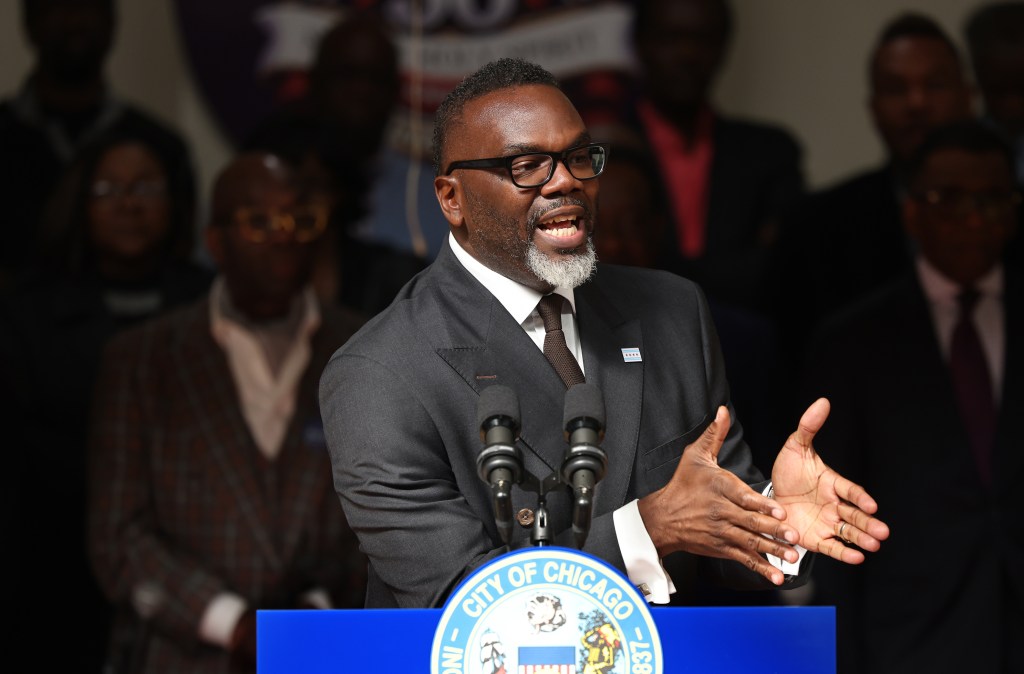With Mayor Brandon Johnson in office until 2027, there must be plenty of Chicagoans having voter remorse. His actions might even have them waxing in vain for Lori Lightfoot’s resurrection.
From dumping the popular ShotSpotter, which locates gunfire in the city’s most violent neighborhoods, to wanting to place an immigrant shelter on top of soil known to have been home to toxic-heavy metals, the first-term mayor of the Midwest’s capital city has caromed from crisis to crisis in his short time in office.
His latest action, engineering a coup last week whereby his own appointed school board resigned, allowing him to appoint an entirely new one, is finding little traction in the Windy City.
The combative mayor ostensibly needs a new Chicago Public Schools board to fire the school district’s chief executive officer. He also wants the new board to sign on to a $300 million high-interest loan to make up for a $223 million budget shortfall and a predicted $1 billion fiscal hole next year, according to city media outlets.
That usurious payday loan would be used to enrich members of the Chicago Teachers Union with a new contract offering $150 million in salaries. Another $175 million would be used for pension payments for city teachers.
Just about everyone — except the progressive mayor, a one-time teacher and former CTU organizer who was elected last year with substantial help of the union — believes the high-interest loan would be fiscally irresponsible. Meanwhile, Johnson has blamed everyone from previous mayors to Illinois Gov. J.B. Pritzker and his Republican predecessor, Bruce Rauner (who proposed a state takeover of CPS in 2016), to former President Richard Nixon for the city and school financial woes.
What usually happens when a school district is struggling financially is the Illinois State Board of Education intervenes, takes control and appoints a new school board. That’s what happened to North Chicago Unit School District 187 in 2010, and Round Lake Unit School District 116 in 2002. Under state oversight, parents and taxpayers in the two districts had little say for more than a decade.
The districts were deep in red ink, but nowhere near the fiscal severity of where Chicago schools, many of which are under-utilized because of declining enrollments, are today. Both Lake County districts have climbed out from under state control, with District 187 reverting back to an elected school board next year.
So why should suburbanites or Downstaters, for that matter, care what happens to Chicago schools or how the city’s executive and legislative bodies govern, or about anything that goes on in the canyons of the big city? Glad you asked.
We all know Chicago is the largest city in Illinois, and it also takes a big chunk of tax dollars paid by residents in every corner of the state. Mayor Johnson contends the state owes Chicago schools about $1 billion. Illinois also owes Lake County schools because the concept of full educational funding continues to evade state lawmakers.
However, Illinois State Police troopers patrol the city’s expressway network, leaving the undermanned Chicago Police Department to concentrate on neighborhood crime. Wily Harold Washington, the city’s first elected Black mayor, consummated that deal with Gov. James Thompson back in the late 1980s in return for the city allowing Illinois Lottery tickets to be sold at Chicago’s two airports. Both men are dead, but the state troopers remain on duty.
Currently, the city has a $223 million gap in its current budget, and faces a nearly $1 billion shortfall in next year’s. Chicago’s leaders want more state money, including funds for a new Bears stadium and a new baseball field for the White Sox.
The CTA, the city’s mass transit agency, in its new budget approved last week, forecasts a deficit of $539 million in 2026, and $642.3 million in 2027, according to several accounts. CTA officials will be lobbying the legislature for increased spending money in the coming months.
Chicago’s leaders maintain they are due a greater share of the fiscal pie in the Land of Lincoln. Because, they say, it has so many people and so many needs, and is the economic engine for Illinois.
That argument may get some backlash from suburbanites and agribusiness communities. Many of the state’s taxpaying Fortune 500 companies are located in suburban Chicago, like Abbvie, Brunswick, Discover and Grainger, to name a few Lake County firms.
Mayor Johnson surely will come calling when the legislature gets back to work, perhaps during the fall veto session next month or next year’s post-election session. He’ll be demanding the billions he thinks the state owes Chicago.
Lake County lawmakers of both parties should stand firm and resist handing over a blank check to a city and school district on shaky financial and managerial footing.
Charles Selle is a former News-Sun reporter, political editor and editor.
X: @sellenews


